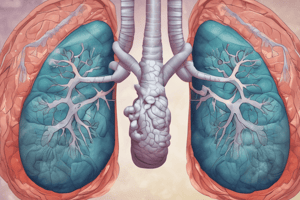Podcast
Questions and Answers
What is a characteristic feature of vascular pulmonary diseases?
What is a characteristic feature of vascular pulmonary diseases?
- Increased oxygen exchange efficiency
- Obstruction to the circulation or disruption of alveolar-capillary membrane (correct)
- Higher lung volume capacity
- Enhanced ventilation rate
What is the incidence of pulmonary embolism according to the provided data?
What is the incidence of pulmonary embolism according to the provided data?
- 310 cases per 1,000,000 persons (correct)
- 1 million cases annually
- 2-5 million cases per year
- 500 cases per 100,000 persons
Which diagnostic method is NOT mentioned for pulmonary disorders?
Which diagnostic method is NOT mentioned for pulmonary disorders?
- Pulmonary function test (correct)
- Chest X-ray
- Echocardiography
- Right heart catheterization
What is the definitive criterion for diagnosing pulmonary hypertension?
What is the definitive criterion for diagnosing pulmonary hypertension?
How many people in the USA are affected by pulmonary hypertension annually?
How many people in the USA are affected by pulmonary hypertension annually?
Flashcards are hidden until you start studying
Study Notes
Vascular Pulmonary Disorders
- Vascular diseases involve pulmonary arteries and veins, leading to obstruction (embolism) or disruption of alveolar-capillary membrane (edema).
- These conditions can result in pulmonary hypertension and right heart failure.
Epidemiology
- Pulmonary embolism has an incidence rate of 310 cases per 1,000,000 persons in Australia.
- In the USA, pulmonary hypertension affects 2-5 million individuals annually.
Disease Classification
- Classification of respiratory diseases is guided by ATS/ERS standards established in 2005.
Diagnostic Techniques
- Computed Tomography Scan: Provides detailed imaging of pulmonary structures.
- Ventilation/Perfusion Scan: Assesses airflow and blood flow in the lungs.
- Echocardiography: Evaluates heart function and structure.
- Right Heart Catheterization: Measures pressures in the heart and lungs, used for definitive diagnosis of pulmonary hypertension.
- Chest X-ray: Offers a basic view of lung conditions.
- Pulmonary Angiogram: Visualizes blood vessels in the lungs to detect blockages.
Pulmonary Hypertension
- Definitive diagnosis requires right heart catheterization showing mean pulmonary artery pressure (PA) >25 mm Hg at rest or ≥30 mm Hg during exercise.
- Mean pulmonary capillary wedge pressure (PCWP) or left ventricular end-diastolic pressure (LVEDP) may also be assessed for comprehensive diagnosis.
Studying That Suits You
Use AI to generate personalized quizzes and flashcards to suit your learning preferences.




